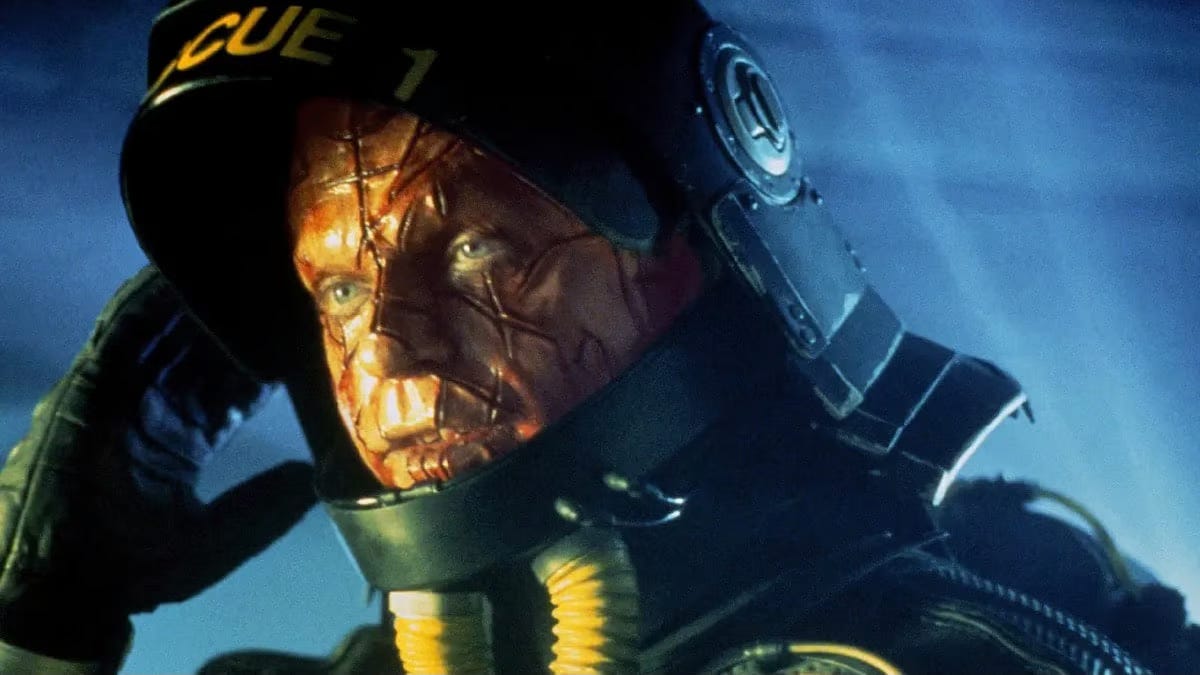It’s October So I Watched a Horror Movie I’d Never Seen Before: ‘Event Horizon’
Like the spaceship at the center of its plot, Paul W.S. Anderson's space horror disappeared in 1997, only to return as an object of puzzlement and curiosity.
I can’t stress enough how easy it was not to see Event Horizon in theaters in the summer of 1997. Released on August 15th, it arrived preceded by a not particularly grabby poster and a not terribly enticing trailer that suggested Laurence Fishburne and others would be stuck on a spaceship with an evil Sam Neill (accurate in its way but also a little vague). It debuted to largely negative reviews and mediocre box office and all but disappeared from theaters after three weeks. (I was reviewing movies for The A.V. Club by that point, but someone else must have drawn that assignment.)
And that was seemingly that. The film seemed destined to disappear into the same mid-‘90s end-of-VHS home video vacuum that would soon swallow other would-be big-deal movies like Red Corner and Mad City. Then, while I wasn’t paying attention, Event Horizon became one of those “What do you mean you haven’t seen…?” movies with a cult to call its own. So I decided to fix that.
Why did this shift happen? I’ve got three theories (none of which should be read as an attempt to dismiss the movie, just to explain elements that might have contributed to continued interest).
1. Repeat exposure
A quick, highly unscientific search of newspapers.com turns up 56,700 matches for “event horizon” between the years 1998 and 2008 in the hundreds of American newspapers in its database. Some belong to stories about black holes, but most point to TV listings. That doesn’t make Event Horizon the most-aired movie on cable television during this era, but it does mean it got played a lot. It also found a second life in the early days of DVD, when movie fans got in the habit of purchasing and collecting physical media filled with bonus features. (Wistful sigh.)
I first started to notice Event Horizon popping up again as part of conversations surrounding my next theory, but my awareness that it had become A Thing reached critical mass through repeated references in a handful of favorite podcasts whose hosts are a micro-generation younger than me. (The one that came home and watched DuckTales after school instead of G.I. Joe.) That means Event Horizon played heavily on TV and became an affordable purchase stocked at your nearest Best Buy at that micro-generation’s peak “let’s just watch whatever’s on TV / let’s check out anything released on this new ‘DVD’ format” years. That’s when those who straddled the late-Gen X / early-millennial divide were in their teens and early twenties while I, born squarely in the heart of Generation X, was in my late-twenties doing things like paying rent on an apartment with a leaky roof, starting a career, and getting married. (Would I trade it all to have seen Event Horizon earlier? Well, no.)
2. Vulgar auteurism
Remember the great vulgar auteur wars of the early-‘10s? I never took a side, but I also could never quite understand where the battle lines had been drawn (or why they were being drawn at all). At its most earnest, vulgar auteurism seemed to be an attempt to make the case that some talented directors working in popular film deserved to be championed in the same way the original auteurists got behind then-similarly underappreciated American filmmakers. No argument there. But there’s one word in the clearest definition of the movement—found in Calum Marsh’s 2013 Village Voice article “Fast & Furious & Elegant: Justin Lin and the Vulgar Auteurs” that set it off, that always gave me pause:
Vulgar Auteurism values work traditionally neglected by critics and academics, championing multiplex hits like Lin’s and also low-budget genre fare, B-movies, action blockbusters, slashers. Instead of Michael Haneke, Wong Kar-wai, or Terrence Malick, it hails Tony Scott, Michael Mann, and John McTiernan.
It’s the “instead” that bugs me and it’s that word that seemed to define the squabbles that followed. You can take your In the Mood for Love and The Thin Red Line and give me Days of Thunder and The Thomas Crown Affair (1999)!. Is it just a coincidence that vulgar auteurism and Tumblr reached their peaks at the same time? Yes, those screenshots of Transformers: Dark of the Moon look cool. But do I have to watch the whole movie?
Event Horizon director Paul W.S. Anderson often ended up at the center of vulgar auteurism discussions, only partly because his name so closely resembles a director
Keep reading with a 7-day free trial
Subscribe to The Reveal to keep reading this post and get 7 days of free access to the full post archives.





